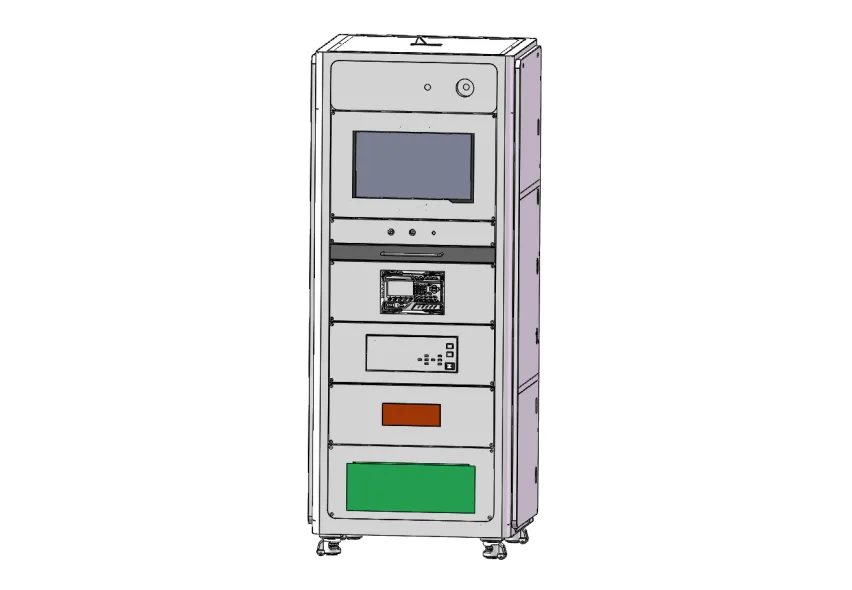In the dynamic landscape of battery manufacturing, the Battery End - of - Line (EOL) Test Machine has emerged as a critical piece of equipment. This article aims to provide a comprehensive understanding of what a battery EOL test machine is, its functions, importance, and the different types available in the market.

Definition and Basics
The term "EOL" stands for End - of - Line. A battery EOL test machine is a specialized device used at the final stage of the battery manufacturing process. Its primary purpose is to perform a series of comprehensive tests on batteries to ensure that they meet the required quality standards and are ready for market distribution.
These machines are designed to evaluate various aspects of a battery's performance, including its electrical characteristics, mechanical integrity, and safety features. By subjecting the batteries to a rigorous testing regime, manufacturers can identify any potential defects or issues that may affect the battery's functionality or lifespan.
Functions of a Battery EOL Test Machine
Electrical Performance Testing
One of the key functions of a battery EOL test machine is to assess the electrical performance of batteries. This includes measuring parameters such as voltage, capacity, internal resistance, and self - discharge rate.
Voltage measurement is a fundamental test that determines the battery's state of charge and its ability to provide the required electrical potential. Capacity testing, on the other hand, measures the amount of electrical charge the battery can store, which is a crucial factor in determining its usability in different applications.
Internal resistance testing helps to evaluate the battery's ability to conduct electricity efficiently. A high internal resistance can lead to power losses and reduced battery performance. Self - discharge rate testing is also important, as it indicates how quickly the battery loses its charge when not in use.
Mechanical Integrity Testing
In addition to electrical performance, a battery EOL test machine also examines the mechanical integrity of the battery. This involves checking for physical damage, such as cracks, dents, or leaks in the battery casing.
Mechanical damage can compromise the safety and performance of the battery. For example, a cracked casing may expose the battery's internal components to the environment, leading to short - circuits or chemical leaks. The EOL test machine uses various techniques, such as visual inspection, ultrasonic testing, and pressure testing, to detect any mechanical defects.
Safety Feature Testing
Safety is of utmost importance in battery manufacturing. Battery EOL test machines are equipped with features to test the battery's safety mechanisms. This includes over - charge protection, over - discharge protection, and short - circuit protection.
Over - charge protection testing ensures that the battery can stop charging when it reaches its maximum capacity, preventing over - heating and potential fire hazards. Over - discharge protection testing verifies that the battery can cut off the discharge process when the voltage drops below a certain level, protecting the battery from irreversible damage. Short - circuit protection testing checks the battery's ability to handle a short - circuit situation without causing any safety issues.
Importance of Battery EOL Test Machines
Quality Assurance
The use of battery EOL test machines is essential for ensuring the quality of batteries. By conducting comprehensive tests at the end of the manufacturing process, manufacturers can identify and reject defective batteries, ensuring that only high - quality products reach the market. This helps to build customer trust and loyalty, as well as reduces the risk of product recalls and associated costs.
Product Performance Optimization
The data collected from the EOL tests provides valuable insights into the battery's performance. Manufacturers can use this data to optimize their manufacturing processes, improve the design of their batteries, and enhance overall product performance. For example, if a particular batch of batteries shows a high internal resistance, the manufacturer can investigate the cause and make necessary adjustments to the production process.
Regulatory Compliance
In many industries, there are strict regulations regarding battery safety and performance. Battery EOL test machines help manufacturers to comply with these regulations by ensuring that their batteries meet the required standards. This is particularly important in industries such as automotive, aerospace, and consumer electronics, where the safety and reliability of batteries are of critical importance.
Types of Battery EOL Test Machines
Manual EOL Test Machines
Manual EOL test machines are the simplest type of test equipment. They require an operator to perform the tests manually, using basic tools and instruments. These machines are typically used in small - scale manufacturing or for testing low - volume production runs. While they are relatively inexpensive, they are also time - consuming and prone to human error.
Semi - Automatic EOL Test Machines
Semi - automatic EOL test machines incorporate some level of automation. They can perform certain tests automatically, such as voltage and capacity measurements, while still requiring an operator to load and unload the batteries. These machines offer a good balance between cost and efficiency, making them suitable for medium - scale manufacturing operations.
Fully Automatic EOL Test Machines
Fully automatic EOL test machines are the most advanced type of test equipment. They are capable of performing all the necessary tests, from loading and unloading the batteries to analyzing the test results, without any human intervention. These machines are highly efficient and accurate, making them ideal for large - scale manufacturing plants. They also offer features such as data logging and reporting, which can be used for quality control and process improvement.
In conclusion, a battery EOL test machine is an essential tool in the battery manufacturing industry. It plays a crucial role in ensuring the quality, performance, and safety of batteries, while also helping manufacturers to comply with regulatory requirements. As the demand for batteries continues to grow in various industries, the importance of these machines will only increase in the future.



